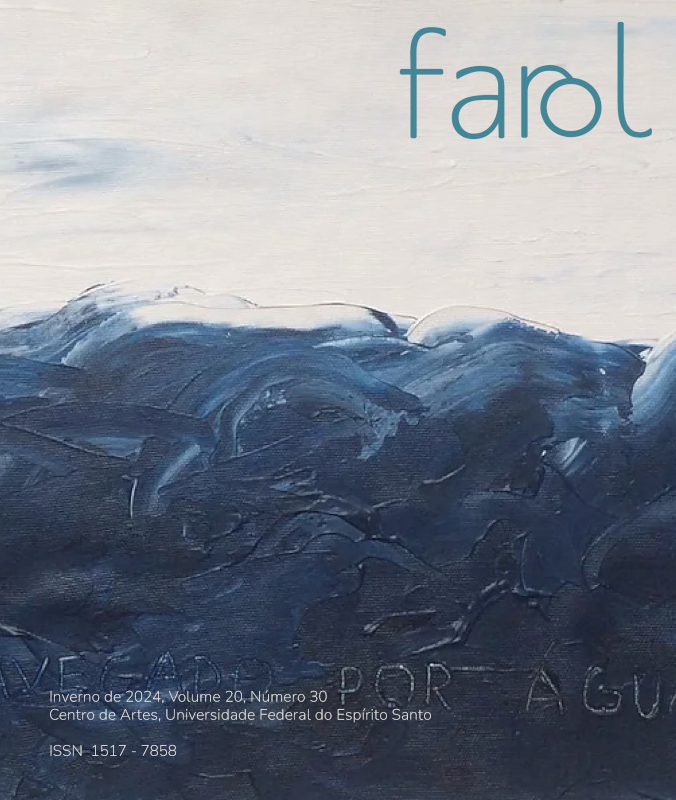“Art is a way of being in the world”
Use of Art by university teachers
DOI:
https://doi.org/10.47456/rf.v20i30.32863Keywords:
Arte, Docência, Ensino Superior, PsicologiaAbstract
The article reports on research that aimed to understand and analyze the use and enjoyment of Art by teachers at a public University in Minas Gerais. Data construction was carried out through an online questionnaire that covered questions such as the definition of Art; interest and appreciation of artistic languages; function of Art at the University and its use in academic activities. We had 38 teachers respond, mostly from Human Sciences, with unanimous interest in Art. Most of us understand it as a form of expression of feelings and human subjectivity and use it in classroom activities. In general, even with the recognition of the importance of Art, it is still necessary to reiterate its use at the University, aiming for an expanded training of future professionals.
Downloads
References
ASBAHR, Flávia Silva Ferreira; SOUZA, Marilene Proença Rebello. “Por que aprender isso, professora?” Sentido pessoal e atividade de estudo na psicologia histórico-cultural. Estudos de Psicologia (UFRN), 19 (3), pp.157-238, 2014.
BARDIN, Laurence. Análise de conteúdo. São Paulo: Edições 70/Livraria Martins Fontes: 1977.
BARROCO, Sônia Mari Shima; TULESKI, Silvana Calvo. Vigotski: o homem cultural e seus processos criativos. Revista Psic. da Educação, 24, pp. 15-33, 2007.
BRONOWSKI, Jacob. Arte e conhecimento – Ver, imaginar, criar. (Tradução Artur Lopes Cardoso). São Paulo: Martins Fontes, 1983.
FACCI, Marilda Gonçalves Dias. Valorização ou esvaziamento do trabalho do professor? Um estudo crítico comparativo da teoria do professor reflexivo, do construtivismo e da psicologia vigotskiana. Campinas, SP: Autores Associados, 2004.
LEITE, Sérgio Antonio da Silva. Bases teóricas do grupo do afeto. In S. A. S. Leite (Org.), Afetividade: as marcas do professor inesquecível (pp. 27-50). Campinas, SP: Mercado de Letra, 2018.
LEONTIEV, Alexis Nikolaevich. (1978). O desenvolvimento do psiquismo. Lisboa: Horizonte Universitário. 1978 (Obra original publicada em 1975).
LEONTIEV, Alexis Nikolaevich. Actividad, Conciencia, Personalidad. Habana: Editorial Pueblo y Educación, 1983. (Obra original publicada em 1975).
LONGAREZI, Andréa Maturano; FRANCO, Patrícia Lopes Jorge. (2013). Educação escolar enquanto unidade significado social/sentido pessoal. Nuances: estudos sobre Educação, 24 (1), pp. 92-109. Disponível https://revista.fct.unesp.br/index.php/Nuances/article/view/2157/0
PESSOA, Camila Turati; SILVA, Silvia Maria Cintra da. Arte e formação continuada de professores: cenas de uma proposta. Revista de Educação PUC-Campinas, 20 (3), pp. 229-239, 2015. Disponível: https://www.redalyc.org/pdf/5720/572061458004.pdf
PESSOA, Camila Turati. Psicologia Educacional e Escolar: Inspirando ideias para a Formação Continuada de Educadores por meio da Arte. Dissertação (Mestrado). Instituto de Psicologia da Universidade Federal de Uberlândia. Uberlândia-MG, 2014.
SILVA, Silvia Maria Cintra da, MACHADO, Paulo Estevão Rodrigues, GOYA, Ana Carolina Adbala. Reflexões sobre o (não) lugar da Arte na Universidade. II Colóquio de Psicologia da Arte. São Paulo: IPUSP, 2007.
SILVA, Silvia Maria Cintra. Psicologia escolar e arte – uma proposta para a formação e atuação profissional. Campinas, SP: Alínea, 2005.
VIGOTSKI, Lev Semionovich. A construção do pensamento e da linguagem. (Trad. P. Bezerra). São Paulo: Martins Fontes, 2001. (Obra original publicada em 1934).
VIGOTSKI, Lev Semionovich. Imaginação e criação na infância. Trad. Zoia Prestes. São Paulo: Ática, 2009.
VIGOTSKI, Lev Semienovich. Psicologia da Arte. Tradução Paulo Bezerra. São Paulo: Martins Fontes, 1999.
Downloads
Published
How to Cite
Issue
Section
License
Copyright (c) 2024 Silvia Maria Cintra da Silva, Giovanna Malavolta Pizzo, Fabiano Prata Stacciarini Jr., Camila Turati Pessoa

This work is licensed under a Creative Commons Attribution-NonCommercial-ShareAlike 4.0 International License.
The authors of works submitted to Revista Farol authorize their publication in physical and electronic media, solely for academic purposes, and may be reproduced as long as the source is cited. They attest to their originality, authorship and originality.





